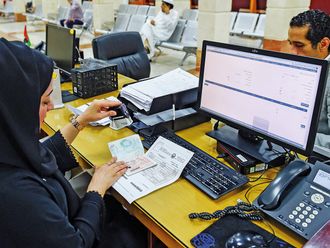
- Residents advised on ways to deal with cyber extortion and blackmail.
- Anonymity of internet makes it relatively easy to commit online crimes, but help is available.
- Community’s cooperation needed to curb ill-effects of such modern day crimes.
Abu Dhabi | Dubai: Facing an extortion attempt or at the receiving end of a blackmail bid online?
Then waste no time. Nip it in the bud, by reporting perpetrators to authorities right away, instead of suffering quietly.
Such was the main thrust of a new information drive by UAE police — encouraging victims to report the matter through the proper channels, which will handle cases with utmost confidence.
Recently, Abu Dhabi Police highlighted common mistakes or weak points exploited by blackmailers and extortionists.
These include: (1) weak religious faith; (2) fake relationships; (3) frequenting suspicious websites; (4) emotional emptiness; (5) neglect in socialisation; (6) addiction to surfing social networking sites; (7) and parents’ failure to monitor and care for their children.
The force, in a statement, highlighted the dangers of cyber extortion and called on community members to avoid the following:
- Do not to accept friend requests from strangers.
- Do not to publish private photos and videos on social media or to send them to unknown people.
- Beware of fake accounts on social media platforms.
- Beware of dating sites and applications, as they are often used as hunting ground for for victims.
Abu Dhabi police explained that extortion is usually based on threats to victims related to publishing pictures or film materials or leaking confidential information — motivated by money, or in order to exploit the victim to carry out illegal acts for the benefit of the blackmailers.

Fake accounts
Authorities warn people about fake accounts on social media. Outwardly, they may show a rather harmless motive — that of one seeking innocent acquaintances — but, in truth, is used as a bait for criminal acts.
Upon acquaintance, a live broadcast is opened with the camera and the victim is filmed in an immoral situation.
The Abu Dhabi Police statement also explained the ways to prevent extortion:
- Do not to succumb to extortion.
- Do not respond to extortion requests.
- Do not to send any sums of money under any direct threat.
- Report extortion attempts by contacting the “Aman” service 24/7, on the toll-free number 8002626 (AMAN2626), or by text message (2828). These round-the-clock services operate in complete secrecy.
Cases in Dubai
In the Dubai emirate, Courts records show a number of crimes that involve blackmail. Authorities say the reason for cyber blackmail cases is the relative easy with which to commit these crimes due to the anonymity the internet gives.
Due to the ability to hide one’s identity, people have the opportunity to give in to temptation, commit criminal acts and lead to antisocial tendencies, including spreading fake news.
How to report blackmail cases / cybercrimes in UAE:
Abu Dhabi
- The eCrime website
- Aman service - Abu Dhabi Police 8002626 (AMAN2626)
- Send text message to 2828 (within UAE)
- Use ‘My Safe Society’ app launched by the UAE’s federal Public prosecution
- Report to nearest police station
Dubai
- Al Ameen service on 8004888 from within the UAE
- +9718004888 from outside the UAE.
- My Safe Society app
- Via Dubai Police website
- Report to nearest police station
Sharjah
- Send SMS to 7999 (within UAE).
- My Safe Society app
- Report to nearest police station
Penalties for blackmail/extortion
Under UAE law, blackmail is an criminal offence, carrying punitive sanctions for convicted perpetrators.
Article 16 of the Federal Decree-Law No. 5 of 2021, prescribes penalties that may include imprisonment of up to 2 years and/or fines of at least Dh250,000 but not more than Dh500,000.
Lawyer’s take: What is extortion?
Extortion is a crime committed by coercively exploiting very sensitive personal information — a personal video clip, or private and family photos, where the blackmailer threatens you to publish these materials online or through social media if you do not submit to his threat and perform an illegal and immoral act that he asks of you.

Extortion is a serious and dangerous crime punishable by law. Extortion is obtaining money or a benefit from a person under the threat of exposing his secrets.
It is often damaging information, and it may be revealed to family members or associates rather than to the general public.
These acts can also involve using threats of physical, mental or emotional harm, or of criminal prosecution, against the victim or someone close to the victim.
Blackmailing is normally carried out for personal gain — most commonly of position, money, or property.
Blackmail is legally defined as a process of intimidation by spreading terror and panic in the same (threatened) person using multiple means and various mechanisms in order to achieve a specific purpose.
It may also be considered a form of extortion, which is the taking of personal property by threat of future harm.
Extortion may also happen alongside a blackmailer's bid to sexually exploit the victim.
The threat may be to expose you by publishing your information, personal picture or video clip if you do not do an illegal and immoral act, or the blackmailer may ask for money in exchange for not publishing this information. Blackmail is a serious crime, even though sometimes the word is applied to less serious situations.
Lawyer Khaled Al-Ahbabi of Khaled Bin Jamhour Al-Ahbabi for Legal Consultation and Advocacy explained to Gulf News: “Extortion is a serious and dangerous crime punishable by law.”
He said: “Extortion is obtaining money or a benefit from a person under the threat of exposing his secrets.”
“Extortion is a very complex issue because it is a process of threatening to reveal certain data or information about a person in word or writing, or to do something aimed at destroying the threatened person, harming his life, or defaming him.
“The perpetrator of the crime of extortion aims to achieve vengeful, immoral, political, and other motives in the event that the victim does not comply with some requests or stop doing some actions, and this information or that data is usually confidential because it is embarrassing or of a nature that makes it socially destructive,” Al-Ahbabi added.
“The extortion process often ends with the threatened person committing an illegal act or the person (the blackmailer) committing violence against him as a result of his failure to respond and acquiesce to him.”
Electronic blackmail is the most common, dangerous and well-known type of extortion.
It is a process of threatening and intimidating a victim by publishing pictures and leaking personal or confidential information in return for exploiting the victim to steal data, pay a sum of money, or turn out to do illegal or illegitimate acts for the benefit of the extortionists.”
What to do if you are subjected to electronic blackmail
Al-Ahbabi offers the following advice to people when a suspected electronic blackmail crime occurs:
- Cut off contact and immediately, end the relationship with the blackmailer.
- Not to continue negotiating with the threat.
- Do not give in to the threat to avoid doubling the risks.
- Control feelings of fear and anxiety and address the safety service surrounding the accident in utmost confidentiality.
- Inform the police authorities to stop the extortion and return to the person who committed the crime of extortion.
- Attempting to prove the fact of extortion, whether by witnesses or any customary document.
In the case of payments to those who made the threat, the amounts paid must be proven in any legal way through which reference can be made, or banknote numbers can be photographed.”
Al-Ahbabi also advised on ways to protect the young ones from online blackmail/extortion. He said: “In order to protect children from exposure to extortion, children must be made aware of the methods, threats and inform them of the reporting mechanisms, or urge them to inform the guardian so that he can follow the correct legal procedures.”
What about in a workplace setting? “If an employee is exposed to a threat related to his work, he must first inform the line manager to avoid legal accountability,” he added
Evolution of the crime
Ibrahim Al Thahli, an Emirati writer, told Gulf News: “[Online Blackmail] can take place in any online service, website or mobiles applications. Blackmailers may be more likely to make threats on private messaging services where images and videos can be shared. However, they may threaten to share information or images in more public social media services — such as their favourite social media platform.

Be careful in dealing with social media and electronic communication such as emails, electronic messages, Instagram, Twitter, Tik Tok, Facebook and Snapchat. Do not publish any personal information of yours and do not send video clips or personal or family photos to others, no matter how strong your relationship with them is.
Al Thahli's advice: "Be careful in dealing with social media and electronic communication such as emails, electronic messages, Instagram, Twitter, Tik Tok, Facebook and Snapchat. Do not publish any personal information of yours and do not send video clips or personal or family photos to others, no matter how strong your relationship with them is.”
He added: “But when you are exposed to blackmail and threat to do any illegal or immoral act or to pay money to the extortionist, the first step you must take is to report to the police via the toll-free number, or through the websites designated by the Ministry of Interior to report these crimes.”
What if someone blackmails you online?
Waste no time and contact your nearest police station. The police will take your case seriously, will deal with it in confidence and will not judge you for being in this situation.
If you are under 18 then immediately report this to your parent or the free toll number for child protection.












